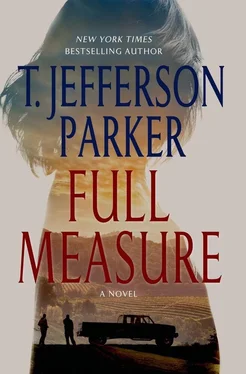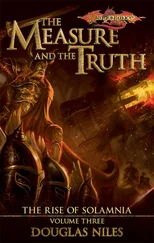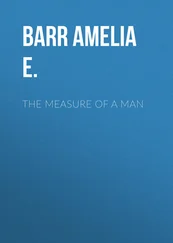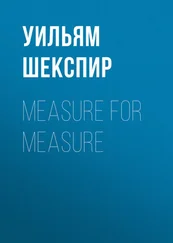Iris looked intently out the truck windows, often turning back to study something they’d just passed. She was alert and curious. Just a glimpse of her did something good to Patrick’s heart. She talked about the latest developments in the Cruzela Storm benefit concert for the lighted Fallbrook crosswalks. She thought it was weird that some people were trying to make their town better while at least one other person was trying to burn it to the ground. Fire Chief Bruck had told her that no terrorist organization had stepped forward to claim responsibility for the Fallbrook fire. He doubted that Al-Qaeda was behind it. He went on to say that 80 percent of arsonists lived within five miles of where they started their fires, which put this guy in Fallbrook, Bonsall, Rainbow, or De Luz.
“He said guy, because there are very few female arsonists,” said Iris.
“You ladies have too much good sense to do that.”
She looked at him dubiously. They made La Jolla in an hour. Patrick looked up at the LDS temple aglow in the night, and the golden trumpeter fixed to the top of the east spire and he wondered if Mormons were anything like Presbyterians. They take care of their own, he thought. He followed his GPS toward the address, which turned out to be a mansion that stood in a neighborhood of mansions staggered high upslope above the city.
Patrick looked down at the ocean below and the lights of La Jolla flickering. He used the intercom and the gate slid open quietly. He came up the drive and spotted the Mako, trailered and displayed beautifully as a jewel in the driveway lights. He felt a quiver of excitement and he braked carefully and pulled up in front of the house. The front lawn was an emerald expanse and sprinklers hissed upon it. Patrick got out and smelled the ocean and thought it went well with the smell of Iris.
He walked slowly around the craft, port to starboard. It was a foam-construction skiff, seventeen feet long, with room for two clients and one captain. It was old but looked well cared for. There were dents and scratches in the decks and gunwales but Patrick saw no patches or dark spots or other signs of waterlogged foam beneath. The cleats and latches looked new. The engine was a Mercury, to which Patrick was partial. Her CF tags were soon to expire but her name, Fatta the Lan ’, was clear in black cursive and recently redone. He felt dizzy with hope. He chanced a glance at Iris, who was looking at him.
A man came down the walk from the house. Patrick heard him before he saw him. He wore a white dress shirt tucked into dark slacks, suspenders, and dress shoes, and he was not much older than Patrick, who half expected the man’s father to come out next. Instead, two small blond boys, dressed in matching red polo shirts, hustled through the door and came down the walk. The man introduced himself as Kevin Pangborn and shook hands with Patrick and Iris. He had a small potbelly — not a couch-potato’s potbelly, Patrick thought, but the potbelly of a well-off man, a man who ate well and played some sport — and his brown hair was short and brushed back. He wore gold cuff links.
“Just back from overseas?” he asked.
“Ten days now.”
“Thank you for keeping this country safe and free. I mean that from the bottom of my heart.”
“You’re welcome, sir.” Patrick watched the boys watching him.
“You said you’re going to guide fly fishers in the bay?”
“That’s right.”
“Great.”
“What do you do for a living?” asked Iris. “If you don’t mind my asking.”
“We raise capital and turn around ailing companies. I’ve done some fly-fishing. It’s not easy. Maybe I can hire you to guide me.”
“I’ll need a boat first,” said Patrick.
“No!” said one of the boys. “It’s ours!”
Pangborn turned to face them and the boys looked down into the Fatta the Lan ’. “Well, Patrick, this Mako would be good for guiding fly fishers. Both casting decks are nonskid and that fore railing I had built will keep your clients from falling overboard. The Mercury’s only got twenty hours on it. The beam is wide so it’s a dry ride even when the chop is bad. The aerator for the bait tank is touchy. I’ve got the GPS and sonar inside the house, and they’re part of the deal. I paid sixteen-two, have the records and service receipts.”
“Why are you selling it?”
“I bought my dream boat, a Triton. And a slip down in San Diego. I don’t need this one anymore.”
The boys stood along the port side of the skiff, brushing their hands along the railing and looking back and forth from their father to the skiff. “Why can’t we keep her, Dad?” one of them said. He looked at Patrick sullenly.
“The boys love this thing,” said Pangborn. An awkward silence followed. “Look, my listing price is thirteen grand but you seem like nice people, so I’ll let her go for twelve-five. Trailer, electronics, cover, everything.”
“No!” the boys hollered in unison. Pangborn pointed to the house and the boys marched up the walkway, muttering and clomping their athletic shoes loudly on the concrete. Patrick saw a tall blond woman gather them in and close the big wooden door.
Patrick thought of the fire, and his father turned down for Farm Credit loans, and the terrible financial shape the Norris family was in. How long would it take him to turn a profit on these eleven thousand dollars? In his mind he formed the sentence “I’ve changed my mind,” but when he spoke it came out differently. “I have eleven thousand.”
“Ouch,” said Pangborn.
“And another thousand in a month.”
Pangborn rubbed his chin and studied Patrick. “You served our country.”
Patrick said nothing.
“I’ll take your eleven. That’s more than good enough.”
Patrick felt his spirits start to rise and he heard an old-fashioned dial tone come from Pangborn’s direction. Pangborn pulled a phone from his pocket and checked the caller. “Patrick? Iris? I’ve got to take this. One of the elders. Give me five minutes, will you?”
Patrick backed the trailer and Fatta the Lan’ into the Norris barn. In the sideview mirror he could see Iris standing by the door, framed in the barnyard lights. Her golden hair shone. Jack and Spike were on scene by now, tails banging away, Spike sticking his nose up under Iris’s sweater. She nudged him away with one knee and a smile. When the boat was in place Patrick cranked down the steel wheel and unhitched the trailer. Iris helped him muscle it over and down.
“Let me guess,” she said. “Right now you want to tear into that engine and see how it looks.”
He smiled and shrugged. “I could wait.”
“I’ll help. I’d rather do something than not.”
“Take a walk with me, then. I’ll show you what’s left of the Norris Brothers groves. Just enough moonlight.”
They walked the dirt road up the hillside to higher ground. In the moonlight the trees below stretched before them, thin and black. They stopped and Iris took his arm in both her hands. “That’s a hard sight to see.”
“We’re hoping half of the burned ones live.”
“Is that realistic?”
“The fire was really fast. That was the one good thing about it.”
She leaned her head against him. “It baffles me that someone set it. What kind of person does that?”
“The Al-Qaeda magazine had instructions for setting forest fires in this country.”
“You’d think they’d take credit.”
“Other than a terrorist, I don’t know who would do it. A person who’s really pissed off? Totally crazy?”
“They say angry, yes. And sexually underdeveloped.”
“Hard to imagine how setting a fire solves that.”
She nodded and Patrick felt the weight of her head against his shoulder. He freed his arm and put it around her and they stood for a long while, awkwardly, neither seeming willing to break off.
Читать дальше












